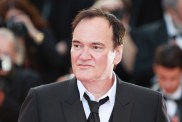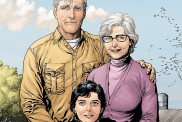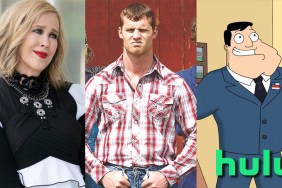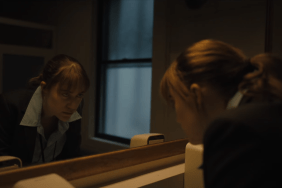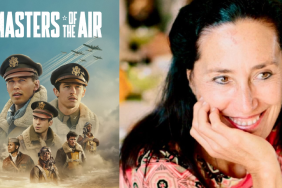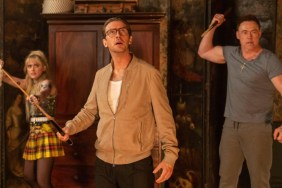Coming from out of the MTV-spawned ’90s comedy group The State, David Wain has spent the last ten years establishing himself as a comedy director, first with the indies Wet Hot American Summer and The Ten and then transitioning into studio comedies with Role Models and Wanderlust. In between those movies, Wain has directed a bunch of television shows, cartoons and web series as well.
They Came Together is Wain’s fifth movie as a director as well as his fifth movie with Paul Rudd, and like his early cut hit Wet Hot American Summer, Wain made this film independently, co-writing with his long-time collaborator Michael Showalter.
In this one, Rudd plays Joel, a generally nice guy who works at a corporate candy giant. After his girlfriend (Cobie Smulders) cheats on him with his co-worker (Michael Ian Black), he meets Amy Poehler’s Molly, who runs a small neighborhood candy shop that Joel’s company is trying to shut down. While they don’t get along at first, for obvious reasons, one can safely assume things will work out in this satire on “meet cute” romantic comedies. To guarantee the laughs, Wain has surrounded Rudd and Poehler with one of the most impressive comedy casts of the year, including Bill Hader, Ellie Kemper and Ed Helms (“The Office”), Jason Mantzoukas (“The League”), Max Greenfield (“New Girl”), Melanie Lynskie and lots of other cameos we won’t give away.
ComingSoon.net got on the phone with Wain a few weeks back for what would be our fifth or sixth interview with the comedy filmmaker since first meeting him at Sundance in 2007.
ComingSoon.net: Are you still in New York these days?
David Wain: No, I’m in Los Angeles. Yeah, we start shooting “Childrens Hospital” on Thursday.
CS: I was curious about that, because you and Michael Showalter were always the New York mainstays from “The State,” but I guess you eventually moved out there because it’s easier for work?
Wain: Yeah, well, actually we both relocated to LA recently.
CS: Well, there you go. At least you were able to capture New York City in a movie before you left.
Wain: I would almost venture to say that New York is like another character.
CS: That’s odd. I’d never heard that in an interview before. Really, no one’s ever said that about a movie they shot in New York in an interview? ever.
Wain: Yeah, well, that’s how we feel about it. It’s something that we thought of.
CS: I saw that you slipped that into the end titles as well, which is pretty funny.
Wain: Yeah, we just wanted to make sure people understood that New York’s like another character in the movie.
CS: Previously, you appeared in Showalter’s movie “The Baxter,” which was also a New York-based romantic comedy, but in a different sense. This isn’t necessarily a spoof, as much as it is a real New York romantic comedy with all the cliches that come with that. What was your mindset while writing this compared to “The Baxter” which he wrote solo?
Wain: “The Baxter,” in another way, is a commentary on the form. It’s kind of upending the notion that the hero of the movie is the romantic lead, whereas in “The Baxter,” it’s the wrong guy is the hero of the movie, but it’s sort of commenting on the form. Our movie also comments on the form in a much more straightforward way, and I think it very much is in the tradition of “Airplane!” or “Blazing Saddles” or whatever. At points, we thought in our self-review as artists that we shouldn’t say that it’s a spoof, but it very much is.
CS: It feels like the term “spoof” is a bad word these days, and I’m not sure why.
Wain: Exactly. Well, I think it’s because a lot of the spoof movies that have been made in the last 20 years have been not very good, so it’s become a thing where we don’t want to be labeled that way, but we wanted to almost harken back to the great tradition of awesome spoof movies that were touchstones for people of our generation, like “Airplane!,” but with our own specific voice to it. There’s a lot of comedy in this movie that is not referential to the genre or that is not spoof comedy, but there’s a lot that is, and we’re not afraid to say so.

CS: Amy and Paul are great in the movie and they really play it like a real romantic comedy. But it kind of goes back and forth between the stuff you normally guys do and just really playing it straight. There’s definitely moments in the movie where people familiar with your work can say, “Okay, that’s David and Michael’s humor in there.” But there’s also parts that could be scenes from a straight romantic comedy.
Wain: I think that a lot of the stuff that’s straightforward romantic comedy scene or dialogue, we just think is funny because of the context or where it is, or just doing those kinds of banal back and forths itself becomes a joke. So I think for people who are enjoying the movie, it all is a joke and it all becomes funny. We like to think of this entire movie is in quotes.
CS: You guys have a very distinctive style of writing dialogue and you’re working with some people who you’ve worked with forever, like Michael Ian Black. What about working with some of the new actors like Melanie Lynskey or Cobie Smulders? Do they get it right away?
Wain: Well, we asked people to be in it. The ones that we didn’t know are the ones that we just felt were just great actors who we suspected would be smart enough to understand what we’re doing and they did, and that’s what’s so exciting. It’s always exciting every time we try to bring in new people into the fold. Our great actors have taken some of this ridiculous dialogue and played it straight and that’s pretty much the formula of making it work.
CS: I was also surprised that Showalter didn’t show up in the movie at all. I kind of thought he’d have at least a small role in it, unless I missed him. I’ve seen the movie twice now. Did I miss him?
Wain: Yeah, no, he had a very tiny cameo in the background of a scene I think that was cut. But he just wanted to focus on being the producer and writer of this one.
CS: I assume you guys were both intimately familiar with the romantic comedy genre beforehand and didn’t have to watch a lot of movies? Or did you do any kind of marathon before writing this to make sure you didn’t miss any of the clichés in there?
Wain: Well, we actually have been working on this script in one form or another for over 10 years, so much of what’s in there is really because Michael and I really love the romantic comedy genre so much and some of our very favorite movies are romantic comedies. We just had it in our bones and no need to go check them again because we memorized so many of our favorite scenes. But then, of course, as we went along, we found other details and looked at a lot of movies and we were interested in, looking at the sort of midlevel semi-forgotten romantic comedies as much as the classics, to find things to lampoon.
CS: Most of your movies so far have been with Paul Rudd, but how did you come back to Amy Poehler for this one for the first time since “Wet Hot American Summer”? Why did you go to her to play the other role?
Wain: Well, I’ve always loved Amy and been in touch with her over the years and work with her whenever I can. I actually just directed a pilot on TV that she was the writer and producer of. But it actually came about because both she and Paul have participated in our staged reading we did of the script of the same weekend that we were all together at the San Francisco Sketch Fest, doing our live radio play version of “Wet Hot American Summer.” A lot of the cast of “Wet Hot American Summer” just happened to be around, so we decided to pull out this script and have a casual reading of it. Afterwards, Amy and Paul came up to us and basically said, “Hey, let’s do this all together on a low budget,” and we did it.
CS: I think the last time we spoke was probably around that time, about two years ago. For some reason, I thought this was the planned sequel to “Wet Hot American Summer” you had been talking about. Until I saw the movie, I still thought that it was somehow related to that, but it’s not at all.
Wain: Only in that it’s a lot of the same people, both in front of and behind the camera.
CS: Especially Christopher Meloni, who he played a crazy role in “Wet Hot American Summer” and he does some crazy stuff in this one as well. Had you been looking to work with him again?
Wain: Yeah, I mean, everyone from “Wet Hot” was just a very special gathering of people and it’s an experience, I think, making that movie, was our first movie. A lot of people involved in it, it was their first movie, too. So we just kind of clicked like a family. Any time we’ve figured out a way to work with any of those actors, we tried. So Meloni agreeing to do this was?he also was in that reading in 2012. He read that role and we were very excited.

CS: Having worked with Paul for such a long time and done so many movies with him, at this point is there anything that surprises you from him when he comes on set and you start shooting?
Wain: I have to say, out of five movies that I’ve done with Paul, he always surprises me, which is kind of one of the reasons I love to work with him. He has the veneer in some ways of a regular guy so to speak, but he comes and brings stuff to every scene that you don’t expect. I know him very well and I know his voice and I write for him, and yet, then he’ll show up and do these performances that are just filled with details and little funny things, small and large, that I never predicted and it’s just such a pleasure to work with somebody like that, who is always giving you plenty of things to work with. A lot of times in the edit room, it’s so hard to choose which take to use because they’re all funny in different ways.
CS: It’s interesting that his career was going the way of being a dramatic actor for a long time and you and Adam McKay kind of dragged him into the world of comedy. That said, he has a faux dramatic moment with Max Greenfield as his brother, so it’s interesting to see him playing a serious dramatic scene that ends up being funny since we know it’s a take on what we’ve seen in other movies.
Wain: Right. It was fun to just do a truly dramatic scene, where we had to give the actors time and space to get into the energy of it. We shot it in a way that we’d do together all at once so that it had a real flow, and I think both the actors had a lot of fun with that, and I’m really happy with how that came out.
CS: I’m always curious about that balance between drama. While this is a straight comedy, I saw Melanie Lynskey in another movie she did called “Goodbye to All That,” where she had a crying scene, but it was sort of a funny crying scene so I was curious about difference between doing a dramatic crying scene and a funny crying scene.
Wain: Basically, sometimes there isn’t much of a difference, which is what makes it so funny.
CS: You’re definitely a master of the comedy montage, and this has a good one as well. What’s the secret to a good montage? Do you just find the right song and do you end up writing every beat of a montage in the script beforehand or is some of it throwing things out with the actor?
Wain: Well, I think with montages, it’s the same as with the rest of the script, where we try to write the very best version we can on the page, and try to think of every detail and every idea of what we want to do in the writing and the planning. But then at the same time, being open to things that come up on set and understanding that things will change when you see your final film. So this was exactly that. A lot of the jokes were planned ahead of time, some of them came up on set, some of them we sort of invented or re-contextualized with the editing. Yes, we gave a lot of thought to the song. I always try to have the songs put together as early as we can before shooting. In this case, the opening song of the movie and the middle montage with Norah Jones were songs that we could have beforehand so that we could actually shoot to the songs.
CS: You have a lot of great cameos of TV actors and comedians, like in the basketball scene. It’s still very scripted, but is there room for improv that either gets in there or doesn’t make it into the movie? How do you do a scene like that where you have a lot of really funny guys who could probably go off?
Wain: Yeah, I mean, unfortunately, we were shooting this one on such a low budget and it’s such a fast schedule, sort of similar to “Wet Hot American Summer” was, so we knew that we didn’t have too much time for a lot of open improv sessions on set. Also, the nature of this movie being a spoof of the very written quality of these ’70s to ’90s romcoms also lends itself to a little bit more of a structured way of working. That said, we certainly tried to give plenty of space when we could to all the actors who are all amazing improvisers, Paul and Amy being two of the best in the world. So it was a mix. But much of what is in the final film does come from the script just because we had to shoot in a very short 23-day schedule.
CS: I’m always interested in the way Craig Wedren approaches the music in your movies and it’s amazing hearing him do a soundtrack to something like this, knowing his background as a rock musician.
Wain: Well, as I’ve learned a lot growing and working as a filmmaker, Craig has also just grown amazingly as a composer, and he’s learned so many different textures and he’s so truly original and talented and musical that he is not faking it. He’s just really invited himself into these other kinds of genres. He also worked this time with Matt Novack, who is a guy who does the music for “Childrens Hospital,” actually. He’s really amazing with these kind of orchestrated type of cues, so together, they were able to build this incredible, lush, and very wonderful score that would normally be done for a much higher budget movie, so I’m very excited about what they did.

CS: That song “Just Say You Love Me” is actually great. You’ll have to submit it for the Oscar consideration because it’s as good as any other song I’ve heard in a movie.
Wain: (Laughs) I agree. I think it’s an amazing song, but it’s always hard to get recognition for something because it’s in the context of a very silly comedy, you know?
CS: Now that you’re going back to “Childrens Hospital,” how long do you take to shoot a season of that?
Wain: We shoot 14 episodes in 28 days. It’s very, very fast. It’s intense. Each episode is incredibly dense and basically has all the progression elements of an hour-long medical drama, but it’s shoved into a two-day shoot.
CS: So all the writing is done for the entire season before you go in and shoot all of it? Is that basically how it works?
Wain: Well, not exactly. In theory. We try to write as much as we can before we start shooting, but inevitably, we’re still writing all the way through the shooting and even into the editing.
CS: I’m looking forward to that. I’m glad that’s still around and people are finding it. Also, I understand you’re going to be developing a series of “Wet Hot American Summer?” That’s the new plan?
Wain: That’s what I heard. I can’t say much beyond that.
CS: The last time I spoke to you, you were still planning to do a sequel to “Wet Hot American Summer” as a movie, right?
Wain: I think what we’re talking about doing now is a prequel that takes place before the events of the movie, but with the original cast now playing way too old for their parts. We’re trying to figure it out right now, but that’s all I can really say about it.
CS: Do you know if Marguerite is going to be back? She’s the only one we haven’t really seen as much of in recent years, I guess.
Wain: Yeah, the idea is that we would have the entire original cast.
CS: You’ve done a lot of TV over the years and you direct a movie every two years or so. Where is your head at these days? Are you generally satisfied doing TV?
Wain: I really like the variety and I just feel very lucky that I’ve been able to have a career where I’ve been able to do a lot of different types of things, but that all still feel like parts of a whole point of view. I’ve really enjoyed going back and forth between TV and internet and movies. Each have their own challenges and their own rewards, and I just feel incredibly lucky that I pretty much wake up every day and decided to work on the project I’m working on and they’re all in one way or another the kind of comedy that I’m excited to make.
CS: Have you thought about doing something like a non-comedy just to stretch your muscles, like an action movie?
Wain: I have. I actually have, and I want to do that very badly, and I’m just essentially either waiting for the opportunity to come up or just for my own self to write something that is a break from the comedy genre. It’ll happen sooner or later, I hope.
They Came Together opens in select cities on Friday, June 27.
(Photo Credit: WENN.com)
They Came Together
-
They Came Together

-
They Came Together

-
They Came Together

-
They Came Together

